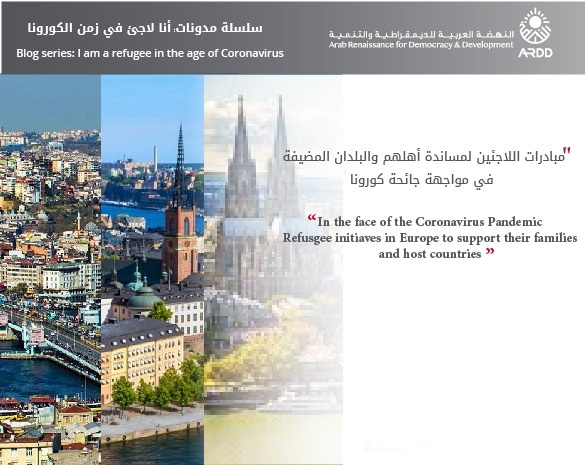Refugees of all origins that are hosted in various countries have acquired several organizational and societal experiences to help them cope with the difficulties of migration. Within the context of COVID-19, many refugees have harnessed those capabilities to assist their families in their homelands, as well as the host communities that they have become a part of.
Considering that a high percentage of the world’s refugees are young people, the methods and tools used for the following initiatives are numerous and have continued to develop and evolve regularly, increasing their effectiveness. Many of these initiatives aim to offer direct support to meet the needs of the surrounding communities, especially with regard to livelihood and health.
Although Sweden arguably has the spread of COVID-19 under control, many refugees have begun working to cover limitations and mobilize volunteers to support patients and the elderly. An example of this is “Together We Are Stronger Against COVID-19,” which according to the Swedish Kompes Network, brings together more than 2,400 volunteers from all Swedish cities. This initiative focuses its efforts on the elderly who live alone by providing their basic needs, in addition to helping sick families by taking their children to school or performing other tasks that require going outside.
In parallel, there is an initiative by the civil activist and designer Khaled Al-Alwani, who, along with other volunteers, has been successful in producing 100-250 medical masks per day for the homes of the elderly, churches and mosques, and for others who need them.
Germany has witnessed a quick emergence of fast organizing initiatives by refugees working with civil society associations. For example, “The White Hearts Initiative” in Wuppertal was able to expand its work with an increasing number of volunteers. In addition to producing medical masks, shopping for the elderly, and providing food for the homeless, many nurse volunteers have –in cooperation with some doctors – started to provide medical services and home follow-up to patients. Likewise, the city of Cologne has witnessed the emergence of the “Coronavirus Fighters initiative,” which provides aid and volunteer support to working parents who cannot leave their children without care at home. In fact, similar initiatives have also reached most of the host countries, including Turkey, with the “Protect myself and my brother” campaign that aims to help the people of Gaziantep.
Remote support and harnessing technology
Many refugees have harnessed their technical expertise to support citizens, such as the “Stay Home” initiative in Berlin, which, according to the “Amal Berlin” network, was launched by Amjad Al-Qur’an with the help of volunteers and programmers. Through this initiative, they have created an online platform that enables the elderly to write down all their needs and request them to be provided by a volunteer. This is similar to the Gemeinsam Gegen Den Virus (Together against the Virus) initiative. Those responsible for this initiative printed the publications and services they provide and put them in buildings because many elderly people with disabilities and patients do not follow social media.
In addition to these initiatives, other campaigns have spread to social network sites in Belgium, Germany, Turkey and others, providing services to help students in their studies, including remote translation for those who need it for their communication or applications and papers.
Aid to the Syrian Homeland
It is evident that Syrians at home face exacerbated challenges due to the fact that the health system has been severely affected by the war. This is in addition to the ongoing shortages in food, electricity and work – especially for daily workers.
Refugees have launched several initiatives to support their families at home. For example, the “Let’s Support Each other” initiative was launched by Sarah Jumaa in Istanbul to secure financial support for the affected families. However, these campaigns are faced by difficulties in transferring money or aid to people inside Syria. These campaigns have been launched by Syrians, Iraqis, Palestinians and others abroad who are active members of their communities. The continuous governmental bureaucracy in their host countries didn’t deter them from facilitating the work of volunteers or providing protection and prevention efforts. Ultimately, such difficulties are not new to them and will not stop their initiatives.


